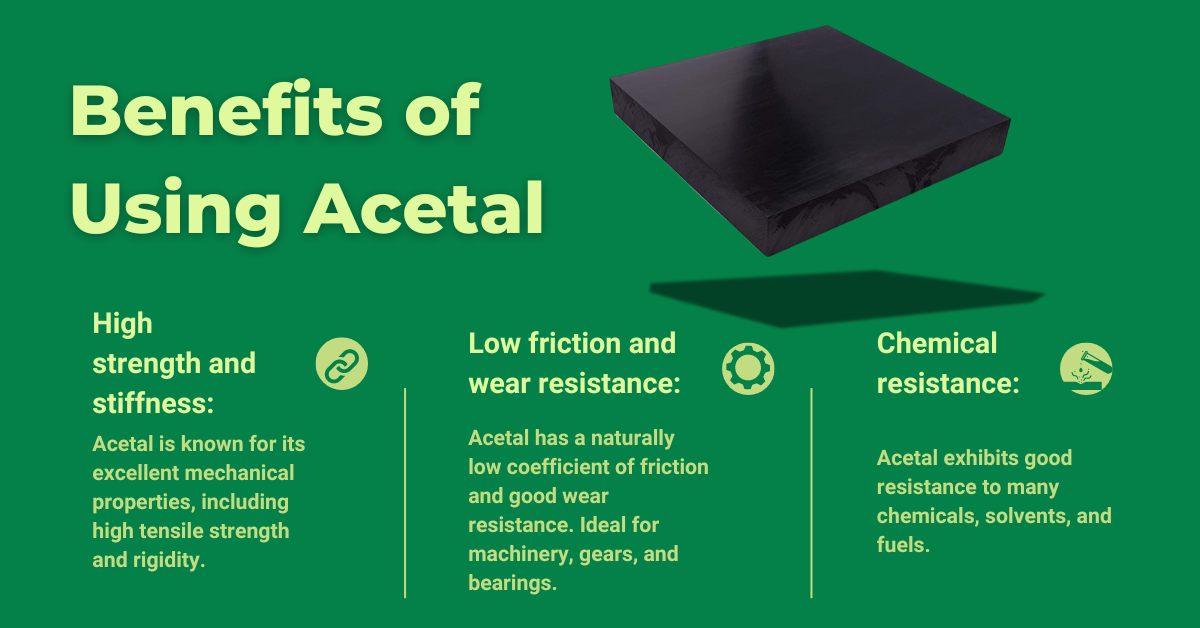What is Acetal?

Introduction to Acetal Plastics
Plastics seem to be everywhere these days, especially in many manufacturing and retail industries. Over the last few decades, plastics have become even more popular and have evolved in some remarkable and beneficial ways. The result of all these enhancements and improvements is acetal.
Acetal is something you may have never heard of before, but it has come into your life in multiple ways. It’s a thermoplastic unlike any other and has found various uses for nearly every type of everyday company that powers your life and business. Its myriad abilities and wide range of uses have turned acetal into one of the most sought-after plastics in the world.
What is acetal and what makes it so special? And why has it become so commonplace when there are other options? on the market? Acetal is one of the strongest and stiffest thermoplastics available, offering exceptional strength and rigidity as well as specific stiffness and simplicity of machining. Acetal is one of the most used high-grade thermoplastics so it's a great choice for complicated components with tight tolerances. Conventional injection molding and extrusion procedures can also be used to process it.
An Industrial Strength Thermoplastics
Acetal is a one-of-a-kind plastic that was created to substitute metal in a variety of applications. It’s forms are made from copolymer and homopolymer resins, which give a high ratio of flexibility while also providing outstanding strength, stiffness, and durability. It is known for its low coefficient of friction and excellent bearing properties.
Thermoplastics are polymers which can be warmed, melted, and solidified again, allowing them to be recycled. Heat converts these polymers to a liquid, allowing them to be molded using current techniques such as plastic injection molding.
Acetal absorbs very little moisture and maintains its physical characteristics across a wide range of conditions. Finally, because acetal has a high melting point, it may be constantly subjected to temperatures between 160°F and 185°F.
Acetal polymers have only been accessible for professional use since around the 1960s. Is it a bit early to presume that acetal, with such a small history compared to metal, can make an entire industry tremble in fear? Perhaps, but it wouldn't be outlandish to investigate how this thermoplastic substance could be utilized to substitute metals in several important industrial uses.
How is Acetal Made?
Almost all plastics are manufactured in the same way. Acetal is made by distilling hydrocarbons into portions, which are then mixed in the presence of a catalyst and polymerized.
Various manufacturing procedures are utilized depending on what type of polymer is getting generated. It's a very technical process that goes like this: h semiformal is made by reacting aqueous formaldehyde with alcohols to yield acetal. Then formaldehyde is subsequently released by distilling or dehydrating the mixture, which is then polymerized in the presence of catalysts to generate Acetal homopolymer.
Currently, acetal is offered in granulated form on the market. Manufacturers employ a technique of heating and adding pressure to turn it into a liquid, which is then molded into desired forms.
Uses and Applications For Acetal Plastics
Engineering components that demand great performance, such as those used in the electronics and automotive industries, are among its uses. Gear wheels, bolts, lock systems, and other items fall into this category.
What are the most frequent and common uses of acetal in modern industries:
- Electrical insulation and various parts of electronic devices
- Vehicle fuel sender units, power windows, door locks, vehicle tanks, turn signals
- Paintball accessories, airsoft guns, and other sports materials
- Milk pumps, food conveyors, and multiple food industry products
- Locks, handles, and other hardware products
- Kitchenware such as knife handles, coffee brewers, and more
- Insulin pens
- Inhalers and other medical-use devices
Benefits and Disadvantages of Acetal
Resistance its strength, resistance to abrasion and most chemicals, and impact resistance, it's an excellent choice for goods that must withstand harsh functional and climate issues. In other words, it can withstand the might of most weather conditions.
Its low friction coefficient and endurance make it an excellent choice for moveable components in autos and trucks, as well as building items such as hinges. Simply put, acetal rarely wears out or falls apart.
Its facile machineability is aided by its widespread availability in the form of sheets and blocks. This means that acetal is coveted and used in many manufacturing and construction industries.
It may also be dyed in whatever color you like (since it is naturally white in its original form). This makes it an excellent choice for aesthetically attractive parts and products. Its ability to be altered and molded into nearly any style or look means its popularity spreads across multiple major industries.
But what about the disadvantages of acetal? There are in fact a few downsides to the remarkable material. While its price variation and its sometimes-high value can be a downside for it, the biggest issue with acetal is that it’s difficult to bind, because to its great chemical resistance. This is particularly true with most glues and common adhesives. Therefore, acetal isn't ideal for designing and modifying.

Are Acetal Plastics Safe?
When something becomes as popular as acetal, it is very important to find out if it is doing damage to the people close to it. After many years and many tests, we are getting a clearer picture of the toxicity of acetal.
Studies have shown that when breathed in vapor or liquid form, acetal has been shown to cause some toxicity. Nevertheless, it is not considered harmful in its solid crystalline state. Acetal is a food-safe material that is used to make food processing equipment and kitchen appliances.
A few grades of Acetal have been authorized by the FDA for use in the food sector. Therefore, it is consistently safe for most uses in the food and service industries.
